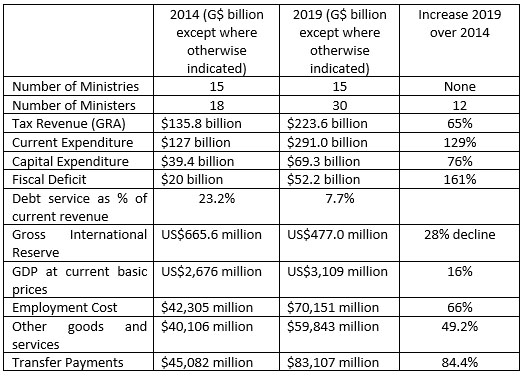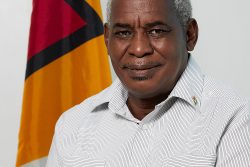Dear Editor,
The governing coalition has now published its Manifesto for the 2020 elections. In structure and content it stands in stark contrast with its own 2015 Manifesto. Broadly, while the 2015 Manifesto promised the Good Life for All, the 2020 Manifesto promises “to lay the foundation of the good life.” With the amount of money the APNU+AFC Government has spent and the manner in which it largely shut out the Opposition in its five-year term, it has underperformed. Its signal achievement of holding local government elections has been marred by autocratic leadership, violations of the Constitution, incompetence, waste of public funds, and more than a fair share of corruption.
The numbers show that it is easily the largest government this country has ever had, with the most resources in terms of money and people at its disposal. Yet, the returns are woefully modest. The APNU+AFC Government has spent about $1,100 billion Guyana dollars or the equivalent of $15 million for every man, woman and child in Guyana. To the obvious question, are we that better off, even its most diehard supporter would struggle to give a positive answer.
As evidence, here are some numbers using the last completed year of the PPP/C Government (2014) and the parameters as reflected in the APNU+AFC 2019 Budget. There is no 2020 Budget until after the elections.
 While the number of ministries has remained the same, there are now thirty ministers if we include de facto ministers like Joseph Harmon and Carl Greenidge who have ceased to hold formal positions as ministers but have retained the powers and compensation of ministers. While the economy grew by 16% tax revenues have risen by 65%. Yet, the fiscal deficit has grown by 161% from $20 billion to $52.2% billion and the gross international reserve has declined by US$188 million or 28%.
While the number of ministries has remained the same, there are now thirty ministers if we include de facto ministers like Joseph Harmon and Carl Greenidge who have ceased to hold formal positions as ministers but have retained the powers and compensation of ministers. While the economy grew by 16% tax revenues have risen by 65%. Yet, the fiscal deficit has grown by 161% from $20 billion to $52.2% billion and the gross international reserve has declined by US$188 million or 28%.
That such a poor return could emerge from a massive increase in tax and other governmental revenue can only be the result of poor and reckless spending. Current expenditure has more than doubled since 2014 while capital expenditure has risen from $39.4 billion to $69.3 billion, an increase of 76%, with far from enough to show for it. As the National Estimates reveal, the Finance Minister increased tax collections far out of line with the growth of the economy and in the context of a substantially reduced debt service obligation.
A significant contributor to the increase in current expenditure is the 66% increase Employment Costs as the Government provided jobs for the Coalition’s supporters while cleansing house Volda Lawrence’s method.
The APNU+AFC has not explained why its 2020 Manifesto has largely rejected the more constructive and measurable policy commitments in its 2015 Manifesto. Yet, the contrast between the 2020 and 2015 Manifestos is so striking that it is hardly likely to escape attention. For me, a 2015 supporter of the APNU+AFC Government, here are some of the things that stand out for their omission.
No more hundred days plan;
No more Cummingsburg Accord disclosure;
No more promise of collective-bargaining in the public service;
No more mention of embrace of labour;
No more public security plan;
No more promise of technical and vocational education is used in every region including regions 1, 7, 8, 9and 10;
No more Region 10 Policy Development Plan;
No more establishment of a specialised NIS Task Force;
No more transportation policy. The reintroduction of a public transportation service hardly qualifies;
No more hinterland policy;
No more rebalancing the powers of the President and Prime Minister;
No more appointment of a National Assembly Budget Office;
No more breaking deadlock in the appointment of Chancellor and Chief Justice;
No more expert Stakeholder Committee to oversee
Implementation of outstanding recommendations of Constitutional Reform Commission
No more commitment to cut waste and extravagance, limit borrowing, lean and clean government, strict accountability and zero tolerance for corruption
It is hard to imagine that the National Assembly gets no mention (only a photograph); that there is no broad legislative agenda, or that there is no population and immigration policy. The role and success of any government are determined by four factors: visionary leadership, policies, people and co-operation. Of all our post-Independence leaders, Granger ranks on the bottom tier in terms of vision with Burnham, Hoyte, Cheddi Jagan and Jagdeo at the top. The policies set out in the Manifesto are the things a Finance Minister usually puts in his Budget Speech, not in a five-year Policy Commitment. On people, the APNU+AFC has shown a preference for perceived loyalty over competence.
Nation-building requires not only the co-operation but the participation of the political opposition. There is no indication, let alone commitment to either of these. The political opposition is not a combat enemy and its supporters certainly not non-people.
This Manifesto fails to impress.
Yours faithfully,
Christopher Ram










